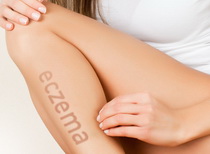![]()
 Eczema is a term for just about any superficial inflammation on the skin. It’s marked by redness, itchiness, skin papules, oozing and crusting. Later on the symptoms develop to scaling, lichenification (the skin becomes leathery and thickened), and skin pigmentation. However, the common signs and symptoms include regions of thickened and red-colored, and frequently itchy skin.
Eczema is a term for just about any superficial inflammation on the skin. It’s marked by redness, itchiness, skin papules, oozing and crusting. Later on the symptoms develop to scaling, lichenification (the skin becomes leathery and thickened), and skin pigmentation. However, the common signs and symptoms include regions of thickened and red-colored, and frequently itchy skin.
The term eczema originates from the Greek word ekzein, which means “to boil out”. The word ek means “out,” as the word “zema” refers to “boiling.” If you’re like most people, you’re probably wondering what the eczema causes are. In this article, we’re going to talk more about them in great detail, but first, we’d like to remind you to consult a dermatologist if you’re experiencing any of the symptoms we mentioned above.
The word eczema is used in two ways. It’s used to describe any rash-like condition on the skin. It is also used to refer to atopic dermatitis, a common skin disorders.
Atopic dermatitis is really a chronic skin ailment that generally begins in infancy and continues into childhood. While most people outgrow the problem, there are many people who still experience it in their adult years.
The term ‘atopic’ is actually an umbrella term for several diseases which some have a hereditary inclination to develop, including dermatitis, hay fever, and asthma. The ‘dermatitis’ in “atopic dermatitis” refers to skin inflammation.
There’s a special type of dermatitis called stasis dermatitis, which develops in the lower legs, and is caused by blood circulation problems. Other forms of dermatitis, however, are triggered by other causes. Pollen is among the most typical allergens that can trigger eczema.
It is a puzzle for many doctors what specifically the eczema causes are, but it’s thought to be because of a mix of hereditary and environment factors. Children may develop eczema if one parent has it or has any other atopic disease. If both mom and dad come with an atopic disease, the probabilities increase further. According to one government agency, roughly half of children who develop atopic dermatitis go and develop another atopic illness.
Women may feel a worsening of their eczema symptoms because their hormonal levels are changing. Some women develop it during pregnancy while some women experience symptoms during certain points during their menstrual period.
One of the eczema causes in babies is associated with antibiotic use. Some British skin care scientists have found that using antibiotics in infants could raise the chance of developing eczema by as much as 40%. There are also some researchers who found that a certain cellular protein causes this condition to develop. Certain cellular interaction can also cause it.
Atopic dermatitis generally manifests itself in infants with dry and scaly patches showing up on the skin. These patches are frequently very itchy. However, the signs and symptoms of atopic dermatitis can differ, largely depending on the age of the individual who has the condition.
Many people develop atopic dermatitis before they’re five to six years old. Half of people that get the symptom in childhood continue to experience the signs and symptoms well into adulthood, though these signs and symptoms are frequently dissimilar to those felt by children.
Eczema breakouts, which are common on the neck, arms, ankles, and the crease between buttocks and the legs, may cause extreme itchiness, which can lead to sleep problems. Continuous rubbing and itching can result in skin infections.
Breakouts can thicken the skin (a process called lichenification) after which knots develop along with a permanent itch.
Adults who have atopic dermatitis in childhood may continue to experience symptoms, dry or easily-irritated skin, eczema on the hands, and eye problems.
Urticaria or hives are red-colored and elevated bumps that could occur after contact with an allergen, after exercise or perhaps after a hot bath.
The thing about eczema is that there’s no diagnostic test for it. Sometime you need to complete a full round of allergy tests before the doctor can diagnose you have it.
Aside from allergy tests, a doctor may need to do a health background with the physician looking into a patient’s genealogy, history with other atopic illnesses hay fever and bronchial asthma, possible contact with irritants, use anabolic steroids or any other medicines, among other things. It’s not unusual for a physician to refer a patient to another specialist or skin doctor for more evaluation.
If there’s no single way to diagnose eczema, there’s also no single way to treat the condition. The most common way to tackle the problem is simply to manage the symptoms, that is, to heal the affected skin and to stop the flares from happening. Doctors frequently prescribe a highly individualized form of treatment for each individual patient. However, a common treatment is to do regular warm baths – these help alleviate the itching…

 OneCareNow is a general weblog that was created by several writers with a specific goal in mind: To offer one place that covers important topics which people really care about.
OneCareNow is a general weblog that was created by several writers with a specific goal in mind: To offer one place that covers important topics which people really care about.



![Back Pain Breakthrough by Palmer & Dr. Young [2024 Review]](https://www.onecarenow.org/wp-content/uploads/2021/02/Back-Pain-Breakthrough-Young-Amy-50x50.png)
![Vincent’s Midas Manifestation System Review [Updated 2024]](https://www.onecarenow.org/wp-content/uploads/2021/02/Midas-Manifestation-50x50.png)
![The NEW Happiness Code by David [Updated 2024 Review]](https://www.onecarenow.org/wp-content/uploads/2021/01/The-NEW-Happiness-Code-50x50.png)
![Michael Christianson’s Manifestation Sigil Review [2024]](https://www.onecarenow.org/wp-content/uploads/2021/01/Manifestation-Sigil-50x50.png)
